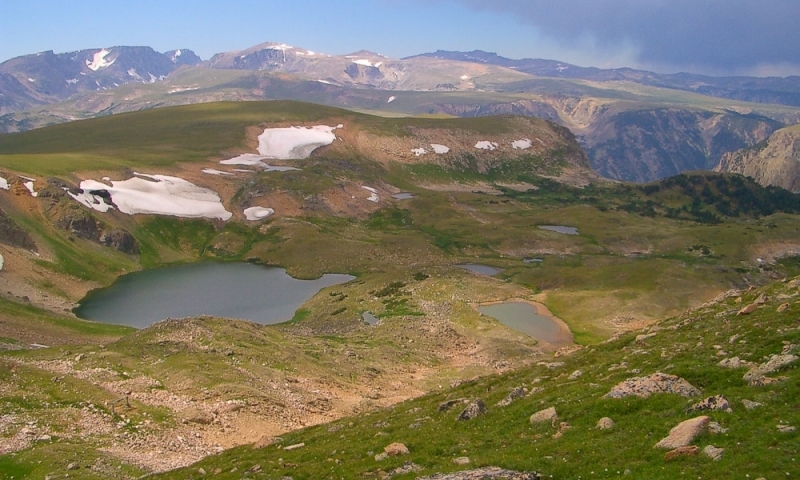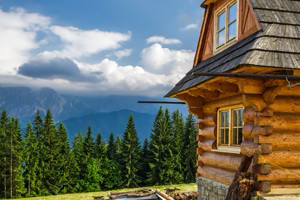- Custer National Forest covers 1.3 million acres, spanning Montana, North Dakota and South Dakota.
- Located near Red Lodge, the Beartooth Ranger District is one of three sections of Custer Forest.
- This district encompasses the Beartooth Mountains, Granite Range, Absaroka-Beartooth Wilderness, and is part of the Greater Yellowstone area.
- Some higher elevated areas may only be accessible between June and September due to remaining snowpack.
- Activities in Custer National Forest MT include wildlife viewing, scenic drives, skiing, snowmobiling, fishing, hiking, and camping.
Overview
Custer National Forest spans three states—Montana, North Dakota, and South Dakota, encompassing nearly 1.3 million acres, 345,599 of which are Designated Wilderness. Known as the most ecologically diverse forest in the Northern Region, Custer National Forest is made up of high alpine mountain country, and small pockets of timbered buttes and grasslands. Its varying terrain allows for numerous recreational activities, camping, as well as scenic drives and wildlife viewing.
Location/Directions
Custer Forest encompasses 10 separate sections that span across Montana and into South Dakota, with elevations ranging from less than 1,000 feet in the Cheyenne Grasslands to 12,799 foot Granite Peak. The Forest is split into three segments for management and topographical purposes—Beartooth Ranger District of south-central Montana, Ashland Ranger District located 130 miles east of Billings, and Sioux Ranger District on the border between the three states.
The Beartooth Ranger District of Custer National Forest Montana is nearest to Red Lodge, Montana. This district which is comprised of the Beartooth Mountains, Granite Range, and Absarokee-Beartooth Wilderness, resides in the Greater Yellowstone area, one of the largest intact temperate ecosystems left on the planet.
The easiest way to access the Beartooth Ranger District is to head west on Ski Run Road/West Fork Road (south of Red Lodge) or follow Highway 212 south past Red Lodge. Alternate routes include East Rosebud Lake Road out of Roscoe, MT, West Rosebud Road out of Fishtail, or the Nye Road out of Nye.
Hours/Seasons
Custer National Forest is open year-round, road conditions permitting. Because of the high elevations, snowpack remains well into June or July making some areas inaccessible. Campgrounds are usually open between May and September. Call the Beartooth District Ranger Station for information on seasonal closures.
Fees/Cost
There is no fee to visit Custer Forest. However, most camping areas charge a fee for overnight camping and day-use. These fees range from $9-$20 per night, $5-$8 for additional vehicles. Day-use is around $6 for over a ½ hour.
Activities
Wildlife Viewing
There is plenty of large and small game to be seen and photographed along the trails and roads of Custer National Forest. Big-game animals include black bear, elk, moose, big horn sheep, mule and whitetail deer, Rocky Mountain goat, cougar, and bobcats. Some of the smaller animals found in Custer Forest are a variety of songbirds, hawks, eagles, owls, gophers, chipmunks, beaver, porcupine, woodchucks, rabbits, and squirrels.
Scenic Drives
Beartooth Scenic Byway is a stretch of Highway 212 that winds its way through the Beartooth Mountains of Custer Forest, connecting Red Lodge to Yellowstone Park. This drive offers picturesque views of the towering mountains, including Granite Peak. Visit our Beartooth Highway & Pass page for more information.
Winter Recreational Activities
- Skiing/Snowboarding: Between April and July, advanced skiers and snowboarders can access the Beartooth Pass (Scenic Byway) ski area at 10,800 feet. The Red Lodge Mountain Resort is also located in the Custer Forest. For more information on skiing in this area, visit our Red Lodge skiing guide.
- Snowmobiling: Within Custer National Forest, Cooke City is famous for its phenomenal snowmobiling. With an average snow depth of 500 inches per year, numerous trails, and close vicinity to Yellowstone National Park, Cooke City is a sledder’s heaven.
- Cross-Country and Backcountry Skiing: There are several areas to cross-country ski with in Custer. Two trails off Highway 212 allow for easy access to the breath-taking wilderness. Lake Fork Ski Trail offers a 3 kilometer and 7 kilometer trail. The Silver Run Ski Trail offers a 4, 7, 11 and 15 kilometer path.
Summer Recreational Activities
- Fishing: Custer Forest is famous for its stream and mountain lakes. Several of the mountain lakes along Highway 212 are stocked by the FWP. One of which, Greenough Lake is located at the base of the Beartooth Scenic Byway. Only a two mile hike from Greenough Campground, this lake is stocked with trout making the fishing phenomenal.
- Hiking: There are numerous trails within the Beartooth Range district, including four National Recreation Trails—Parkside, Silver Run, Wild Bill Lake, and Parkside. Some of the back-country trails allow mountain biking and equestrian riding.
- Climbing: The most famous climb in Montana is to the tallest peak in our state, Granite Peak. There are three trails leading to the summit. Located west of Red Lodge, the Granite Peak Trail is full of extreme challenges and should be ventured with caution.
- Camping: There are approximately 20 campgrounds and day-use areas within this district. These campgrounds are located along the Main Fork of Rock Creek, the West Fork of Rock Creek, East Rosebud, West Rosebud, and upper Stillwater Valley. Fees and amenities vary.
Contact
Custer National Forest—Beartooth Ranger District
6811 Highway 212 South
Red Lodge, MT 59068
Tel: (406)446-2103
US Forest Service--Custer National Forest








